112 scholarly books by Bucknell University Press and 8
start with T
112 scholarly books by Bucknell University Press and 8
112 scholarly books by Bucknell University Press
8 start with T start with T
8 start with T start with T
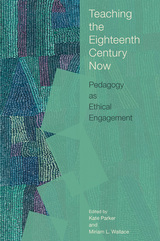
Teaching the Eighteenth Century Now
Pedagogy as Ethical Engagement
Kate Parker
Bucknell University Press, 2024
In this timely collection, teacher-scholars of “the long eighteenth century,” a Eurocentric time frame from about 1680 to 1832, consider what teaching means in this historical moment: one of attacks on education, a global contagion, and a reckoning with centuries of trauma experienced by Black, Indigenous, and immigrant peoples. Taking up this challenge, each essay highlights the intellectual labor of the classroom, linking textual and cultural materials that fascinate us as researchers with pedagogical approaches that engage contemporary students. Some essays offer practical models for teaching through editing, sensory experience, dialogue, or collaborative projects. Others reframe familiar texts and topics through contemporary approaches, such as the health humanities, disability studies, and decolonial teaching. Throughout, authors reflect on what it is that we do when we teach—how our pedagogies can be more meaningful, more impactful, and more relevant.
Published by Bucknell University Press. Distributed worldwide by Rutgers University Press.
Published by Bucknell University Press. Distributed worldwide by Rutgers University Press.
[more]
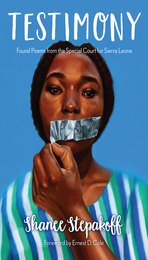
Testimony
Found Poems from the Special Court for Sierra Leone
Shanee Stepakoff
Bucknell University Press, 2021
IBPA Benjamin Franklin Award™ gold winner, poetry category
Sierra Leone’s devastating civil war barely caught the attention of Western media, but it raged on for over a decade, bringing misery to millions of people in West Africa from 1991 to 2002. The atrocities committed in this war and the accounts of its survivors were duly recorded by international organizations, but they run the risk of being consigned to dusty historical archives.
Derived from public testimonies at a UN-backed war crimes tribunal in Freetown, this remarkable poetry collection aims to breathe new life into the records of Sierra Leone’s civil war, delicately extracting heartbreaking human stories from the morass of legal jargon. By rendering selected trial transcripts in poetic form, Shanee Stepakoff finds a novel way to communicate not only the suffering of Sierra Leone’s people, but also their courage, dignity, and resilience. Her use of innovative literary techniques helps to ensure that the voices of survivors are not forgotten, but rather heard across the world.
This volume also includes an introduction that explores how the genre of “found poetry” can serve as a uniquely powerful means through which writers may bear witness to atrocity. This book’s unforgettable excavation and shaping of survivor testimonies opens new possibilities for speaking about the unspeakable.
Sierra Leone’s devastating civil war barely caught the attention of Western media, but it raged on for over a decade, bringing misery to millions of people in West Africa from 1991 to 2002. The atrocities committed in this war and the accounts of its survivors were duly recorded by international organizations, but they run the risk of being consigned to dusty historical archives.
Derived from public testimonies at a UN-backed war crimes tribunal in Freetown, this remarkable poetry collection aims to breathe new life into the records of Sierra Leone’s civil war, delicately extracting heartbreaking human stories from the morass of legal jargon. By rendering selected trial transcripts in poetic form, Shanee Stepakoff finds a novel way to communicate not only the suffering of Sierra Leone’s people, but also their courage, dignity, and resilience. Her use of innovative literary techniques helps to ensure that the voices of survivors are not forgotten, but rather heard across the world.
This volume also includes an introduction that explores how the genre of “found poetry” can serve as a uniquely powerful means through which writers may bear witness to atrocity. This book’s unforgettable excavation and shaping of survivor testimonies opens new possibilities for speaking about the unspeakable.
[more]
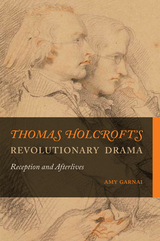
Thomas Holcroft’s Revolutionary Drama
Reception and Afterlives
Amy Garnai
Bucknell University Press, 2023
A key figure in British literary circles following the French Revolution, novelist and playwright Thomas Holcroft promoted ideas of reform and equality informed by the philosophy of his close friend William Godwin. Arrested for treason in 1794 and released without trial, Holcroft was notorious in his own time, but today appears mainly as a supporting character in studies of 1790s literary activism. Thomas Holcroft’s Revolutionary Drama authoritatively reintroduces and reestablishes this central figure of the revolutionary decade by examining his life, plays, memoirs, and personal correspondence. In engaging with theatrical censorship, apostacy, and the response of audiences and critics to radical drama, this thoughtful study also demonstrates how theater functions in times of political repression. Despite his struggles, Holcroft also had major successes: this book examines his surprisingly robust afterlife, as his plays, especially The Road to Ruin, were repeatedly revived worldwide in the nineteenth century.
[more]
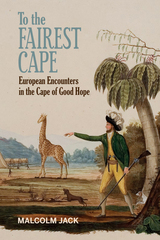
To the Fairest Cape
European Encounters in the Cape of Good Hope
Jack, Malcolm
Bucknell University Press, 2019
Crossing the remote, southern tip of Africa has fired the imagination of European travellers from the time Bartholomew Dias opened up the passage to the East by rounding the Cape of Good Hope in 1488. Dutch, British, French, Danes, and Swedes formed an endless stream of seafarers who made the long journey southwards in pursuit of wealth, adventure, science, and missionary, as well as outright national, interest. Beginning by considering the early hunter-gatherer inhabitants of the Cape and their culture, Malcolm Jack focuses in his account on the encounter that the European visitors had with the Khoisan peoples, sometimes sympathetic but often exploitative from the time of the Portuguese to the abolition of slavery in the British Empire in 1833. This commercial and colonial background is key to understanding the development of the vibrant city that is modern Cape Town, as well as the rich diversity of the Cape hinterland.
Published by Bucknell University Press. Distributed worldwide by Rutgers University Press.
Published by Bucknell University Press. Distributed worldwide by Rutgers University Press.
[more]
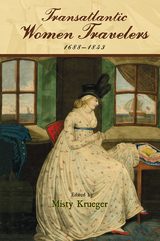
Transatlantic Women Travelers, 1688-1843
Misty Krueger
Bucknell University Press, 2021
This important new collection explores representations of late seventeenth- through mid-nineteenth-century transatlantic women travelers across a range of historical and literary works. While at one time transatlantic studies concentrated predominantly on men’s travels, this volume highlights the resilience of women who ventured voluntarily and by force across the Atlantic—some seeking mobility, adventure, knowledge, wealth, and freedom, and others surviving subjugation, capture, and enslavement. The essays gathered here concern themselves with the fictional and the historical, national and geographic location, racial and ethnic identities, and the configuration of the transatlantic world in increasingly taught texts such as The Female American and The Woman of Colour, as well as less familiar material such as Merian’s writing on the insects of Surinam and Falconbridge’s travels to Sierra Leone. Intersectional in its approach, and with an afterword by Eve Tavor Bannet, this essential collection will prove indispensable as it provides fresh new perspectives on transatlantic texts and women’s travel therein across the long eighteenth century.
[more]
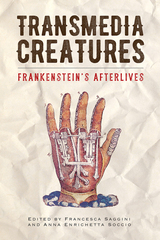
Transmedia Creatures
Frankenstein’s Afterlives
Saggini, Francesca
Bucknell University Press, 2018
On the 200th anniversary of the first edition of Mary Shelley’s Frankenstein, Transmedia Creatures presents studies of Frankenstein by international scholars from converging disciplines such as humanities, musicology, film studies, television studies, English and digital humanities. These innovative contributions investigate the afterlives of a novel taught in a disparate array of courses - Frankenstein disturbs and transcends boundaries, be they political, ethical, theological, aesthetic, and not least of media, ensuring its vibrant presence in contemporary popular culture. Transmedia Creatures highlights how cultural content is redistributed through multiple media, forms and modes of production (including user-generated ones from “below”) that often appear synchronously and dismantle and renew established readings of the text, while at the same time incorporating and revitalizing aspects that have always been central to it. The authors engage with concepts, value systems and aesthetic-moral categories—among them the family, horror, monstrosity, diversity, education, risk, technology, the body—from a variety of contemporary approaches and highly original perspectives, which yields new connections. Ultimately, Frankenstein, as evidenced by this collection, is paradoxically enriched by the heteroglossia of preconceptions, misreadings, and overreadings that attend it, and that reveal the complex interweaving of perceptions and responses it generates.
Published by Bucknell University Press. Distributed worldwide by Rutgers University Press.
Published by Bucknell University Press. Distributed worldwide by Rutgers University Press.
[more]
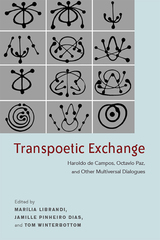
Transpoetic Exchange
Haroldo de Campos, Octavio Paz, and Other Multiversal Dialogues
Marília Librandi
Bucknell University Press, 2020
Transpoetic Exchange illuminates the poetic interactions between Octavio Paz (1914-1998) and Haroldo de Campos (1929-2003) from three perspectives--comparative, theoretical, and performative. The poem Blanco by Octavio Paz, written when he was ambassador to India in 1966, and Haroldo de Campos’ translation (or what he calls a “transcreation”) of that poem, published as Transblanco in 1986, as well as Campos’ Galáxias, written from 1963 to 1976, are the main axes around which the book is organized.
The volume is divided into three parts. “Essays” unites seven texts by renowned scholars who focus on the relationship between the two authors, their impact and influence, and their cultural resonance by exploring explore the historical background and the different stylistic and cultural influences on the authors, ranging from Latin America and Europe to India and the U.S. The second section, “Remembrances,” collects four experiences of interaction with Haroldo de Campos in the process of transcreating Paz’s poem and working on Transblanco and Galáxias. In the last section, “Poems,” five poets of international standing--Jerome Rothenberg, Antonio Cicero, Keijiro Suga, André Vallias, and Charles Bernstein.
Paz and Campos, one from Mexico and the other from Brazil, were central figures in the literary history of the second half of the 20th century, in Latin America and beyond. Both poets signal the direction of poetry as that of translation, understood as the embodiment of otherness and of a poetic tradition that every new poem brings back as a Babel re-enacted.
This volume is a print corollary to and expansion of an international colloquium and poetic performance held at Stanford University in January 2010 and it offers a discussion of the role of poetry and translation from a global perspective. The collection holds great value for those interested in all aspects of literary translation and it enriches the ongoing debates on language, modernity, translation and the nature of the poetic object.
Published by Bucknell University Press. Distributed worldwide by Rutgers University Press.
The volume is divided into three parts. “Essays” unites seven texts by renowned scholars who focus on the relationship between the two authors, their impact and influence, and their cultural resonance by exploring explore the historical background and the different stylistic and cultural influences on the authors, ranging from Latin America and Europe to India and the U.S. The second section, “Remembrances,” collects four experiences of interaction with Haroldo de Campos in the process of transcreating Paz’s poem and working on Transblanco and Galáxias. In the last section, “Poems,” five poets of international standing--Jerome Rothenberg, Antonio Cicero, Keijiro Suga, André Vallias, and Charles Bernstein.
Paz and Campos, one from Mexico and the other from Brazil, were central figures in the literary history of the second half of the 20th century, in Latin America and beyond. Both poets signal the direction of poetry as that of translation, understood as the embodiment of otherness and of a poetic tradition that every new poem brings back as a Babel re-enacted.
This volume is a print corollary to and expansion of an international colloquium and poetic performance held at Stanford University in January 2010 and it offers a discussion of the role of poetry and translation from a global perspective. The collection holds great value for those interested in all aspects of literary translation and it enriches the ongoing debates on language, modernity, translation and the nature of the poetic object.
Published by Bucknell University Press. Distributed worldwide by Rutgers University Press.
[more]
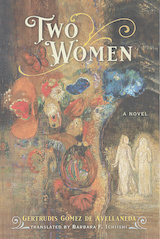
Two Women
A Novel
Barbara F. Ichiishi
Bucknell University Press, 2022
In 1842, a young Cuban woman living in Spain published a novel that was so passionate and boldly feminist in content, it did not appear in her homeland until more than seventy years later. Two Women tells the riveting tale of a tumultuous love triangle among three wealthy Spaniards: a brilliant, young, widowed countess named Catalina, her inexperienced lover Carlos, and his pure and virtuous wife Luisa. The two women start out as rivals, yet in an insightful twist, they ultimately find they are both victims of a patriarchal society that ruthlessly pits women against each other. As the story builds to its thrilling climax, they confront the stark truth that in nineteenth-century Spain, women have few paths to a happy ending.
This first English translation of the novel captures the lyrical romanticism of its prose and includes a scholarly introduction to the work and its author, Gertrudis Gómez de Avellaneda, a pioneering feminist and anti-slavery activist who based the character of Catalina on her own experience. Two Women is a searing indictment of the stern laws and customs governing marriage in the Hispanic world, brought to life in a spellbinding, tragic love story.
This first English translation of the novel captures the lyrical romanticism of its prose and includes a scholarly introduction to the work and its author, Gertrudis Gómez de Avellaneda, a pioneering feminist and anti-slavery activist who based the character of Catalina on her own experience. Two Women is a searing indictment of the stern laws and customs governing marriage in the Hispanic world, brought to life in a spellbinding, tragic love story.
[more]
READERS
Browse our collection.
PUBLISHERS
See BiblioVault's publisher services.
STUDENT SERVICES
Files for college accessibility offices.
UChicago Accessibility Resources
home | accessibility | search | about | contact us
BiblioVault ® 2001 - 2024
The University of Chicago Press









